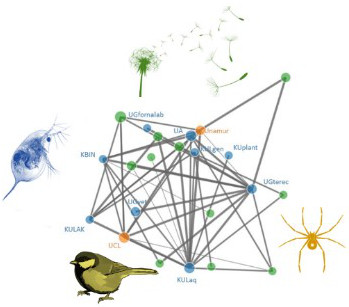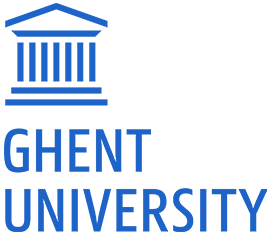 |
Joint symposium on | ||||||||||||||||||||||||||||||||||||||||||||||||||||||||||||||||||||||||||||||||||||||||||||||
|
| Home | Program - EVENET - FAME | Abstracts - EVENET - FAME | Download | Registration | Venue | Committees |
FAME Scope symposia
Timing
Symposia: 5 min introduction convener(s), Opening talks 25 mins, other talks 15 mins (symposium 3 and 4 introduction + opening talk 40 mins)
Symposium 1: Global change and biodiversity: impact and mitigation
Global change phenomena are affecting biodiversity worldwide, with potentially serious repercussions for the ecosystem functioning and services. However, the precise ways in which global change impacts biodiversity are multiple and complex. Species can be lost or gained (introductions), species ranges, turnover and relative abundance patterns can be affected, genetic diversity can be altered, etc. Understanding how global change precisely affects biodiversity patterns and community assembly and dynamics is essential for designing mitigation measures, but requires the integration of ecological and evolutionary approaches at multiple spatial and temporal scales. In this symposium, we invite presentations about studies on all aspects of the relationship between global change and biodiversity, with special emphasis on studies which adopt integrated approaches to unravel biodiversity patterns in relation to global change, and studies which specifically attempt to address the problem of mitigating biodiversity change.
Symposium 2: Emerging infectious diseases
We will focus on endemic and emerging infectious diseases (EIDs) in an European context and more specifically, how environmental change affect the spread of these diseases. The growing risk of increasing infectious diseases stands high on the international research agenda. Their distribution is shifting rapidly and some of the tropical diseases are currently crossing borders of Europe. This is driven by a combination of key international and local developments such as climate change, international trade, travel and transport, biodiversity loss, and local habitat fragmentation due to urbanization. These factors strongly impact the distribution (and biology) of arthropod vectors and intermediate host species that transmit infectious diseases. Understanding these dynamics is paramount to control and prevent further disease spread. Another key element is early detection, which necessitates robust and rapid monitoring tools and strategies. We aim to bring together specialists working on various aspects related to infectious diseases in order to build an active community with respect to EIDS and to delineate important drivers of disease spread.
Symposium 3: Functional biodiversity
Functional biodiversity research has emerged as an interdisciplinary research area aiming at quantifying the relative importance of biodiversity for ecosystem functioning and services. Based on extensive experiments in various systems, there is now broad scientific consensus that differences in biodiversity causes important ecosystem responses—an increase in the diversity of local communities generally increases functioning or benefits to people. Nevertheless, results from this research area have been criticised as well, for statistical reasons and, more importantly, for their relevance to real-world ecosystems. A new generation of functional biodiversity research has started to address this critique, with a focus on the representativeness and comprehensiveness of the studied questions and systems. This includes upscaling from experiments to landscapes, adding real-world environmental gradients such as pollution or climate, quantifying context dependencies of biodiversity effects, determining ecosystem multifunctionality. Here we particularly invite contributions that integrate one or more of such complexities into their study of functional biodiversity. The scope can be any biological system or study approach, so that we can get inspired by the approaches and frameworks used by our colleagues.
Symposium 4. Ecological and Evolutionary genomics
Contemporary biodiversity patterns are shaped by ecological interactions between organisms and between organisms and the environment. Human induced environmental changes (habitat fragmentation, climate change, pollution, …) are increasing dramatically and can have profound effects on ecosystem stability and functioning by detoriating diversity and altering ecological interactions. The advances in next generation sequencing technologies now allow to investigate the impact of such interactions on the genome, even in non-model species, and are likely to greatly advance our knowledge and understanding of how the environment, including human induced changes, shapes species distributions on an evolutionary and ecological time scale. Here we invite contributions that use next generation sequencing to deliver novel insights in the genomic basis of adaptation, speciation, phenotypic traits and behavior, in the genomic differences between and within populations in relation to environmental barriers and stressors, to investigate genome – microbiome interactions and to describe biodiversity patterns from aquatic and terrestrial environments.
Symposium 5. Urban Ecology
It is expected that by 2050, 70% of the world population will be urbanites. Flanders is one of the most densely built and urbanised regions in Europe and therefore offers major opportunities to study ecological patterns and processes in the urban environment. Urbanisation is arguably the most severe and irreversible driver of ecosystem change on the planet, affecting habitat availability and habitat quality, the spatial arrangement and connectivity of habitats, the species composition and diversity, as well as the evolutionary selection pressures on populations persisting in the urban environment. For this session, we invite contributions that apply traditional and advanced ecological principles and concepts to urban ecosystems. Our aim is to bring together specialists working on various aspects in the domain of urban ecology in order to achieve a better understanding of the complex interrelations, the ecological and evolutionary dynamics, and the ecosystem functions provided by urban ecosystems. Such knowledge is mandatory to create a framework for urban developers making cities and urbanised areas more sustainable and resilient, as well as for conservation biologists facing the challenge of urbanisation.
Symposium 6. Long Term Ecosystem Research
Long Term Ecosystem Research (LTER) is aimed at collecting in-situ relevant ecosystem (and/or socio-ecological) data and conducting (experimental) research that enhances our understanding of ecosystem functioning and ecosystem change. To illustrate the necessity of long-term data collection and research to solve pressing ecological and socio-ecological problems, we invite people to provide examples of such initiatives in this session.
|


